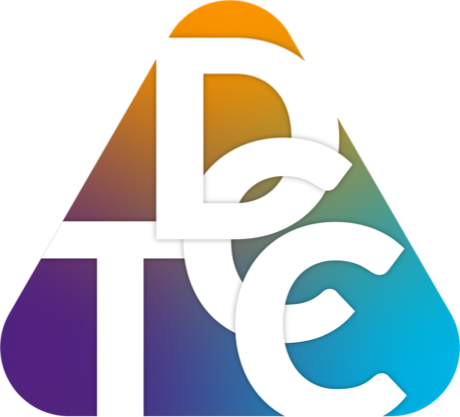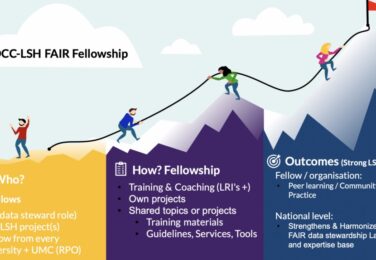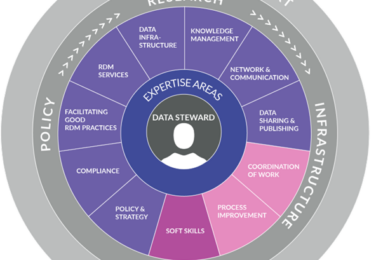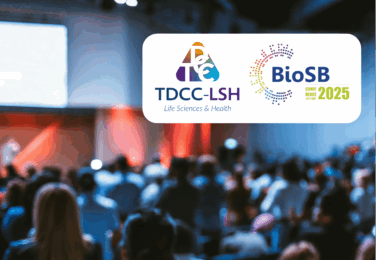
Building capacity for data stewardship in the Netherlands: formal job profiles, training and career perspective
Author: Fieke Schoots
Are there enough data stewards at Research Performing Organisations in the Netherlands? Are they well organized and easy to find? Do they have official job profiles and appropriate training opportunities? How about their career perspective?
These and other questions have been raised during a workshop on 4 April 2023 in Utrecht, organised by the TDCC LSH together with a large number of partner organisations (see below). A full report and the slide deck are now available in Zenodo.
The workshop took place two years after the publication of a groundbreaking report: Professionalising data stewardship in the Netherlands. Competences, training and education. Dutch roadmap towards national implementation of FAIR data stewardship (1.0). Zenodo. https://doi.org/10.5281/zenodo.4486423. This report, commissioned by ZonMw on behalf of the National Programme Open Science (NPOS), recommends implementation steps that should lead to optimal data stewardship capacity. The report contained components of job profiles for data stewards and research software engineers (RSE) and examples of formal job descriptions.
One major accomplishment that was made possible by the report was the inclusion of the data steward as a formal position in the job classification system (UFO) of the Universities of the Netherlands in 2021. A formal job profile is a crucial step towards professionalising data stewardship. It not only contributes to the recognition and appreciation of data professionals such as the data steward, but also underlines the need for adequate training provision, capacity building and career prospects for data stewards. More recently, the eScience Center published their job profile and role description of RSEs, “to give RSEs inside and outside the eScience Center the recognition they deserve”.
Two years after the publication of the NPOS report, 30 representatives from Dutch research organisations got together at the Holland Heart House in Utrecht to discuss lessons learnt from the adoption and implementation of official data stewards job profiles in the Netherlands. The audience consisted of policy and decision makers, data steward coordinators and data stewards involved in building capacity for data stewardship within their organisations. The discussion was centered around five recommendations on formalization of the job profile, organization of data stewards, data stewards' capacity, availability of training and career perspectives for data stewards (see the table below).
Maria Cruz opened the workshop on behalf of Hans de Jonge from Open Science NL and stressed the importance of sustaining data stewardship capacity. Next, Mijke Jetten, one of the lead authors of the NPOS report, briefly recalled the main outcomes of the NPOS report, such as the basic job profile components of a data steward (Figure 4.2 in the report).

Yan Wang presented the process at TU Delft of gradually converting existing and new data stewards to the official UFO profile. Similarly, Peter-Bram ‘t Hoen explained how the job profile described in the NPOS report is used at Radboudumc. Renate Mattiszik presented the profile developed by the DCC-PO (the Digital Competence Center for the joint Universities of Applied Sciences) in the ‘Handreiking voor de Organisatie van Datastewardship voor praktijkgericht onderzoek van hogescholen’. Adoption of this profile is still pending approval by the boards of the Universities of Applied Science. Celia van Gelder and Yan Wang then introduced the work done internationally by the EOSC Association taskforce for Data Stewardship, curricula and career paths and the RDA working group on Professionalising Data Stewardship.
To conclude, all participants discussed about the current status and what the next steps regarding the recommendations would need to be. All agreed that one recommendation has been successfully adopted at all Dutch RPOs: data stewards are nowadays well organised and easy to find. As to the formalisation of the data steward job profile, the universities and some academic hospitals are more advanced than the Universities of Applied Science. More clarity on data stewards' tasks within these organisations would probably help to get the job profiles officially adopted. None of the presenters was satisfied with the current data steward capacity at their institution. To increase this capacity, it is essential to team up with all stakeholders and find senior researchers or deans who can act as ambassadors for data stewardship.
With regards to the availability of education and training of data stewards, there is still work to do. There are well established and popular data management / data stewardship courses in the Netherlands: Essentials 4 Data Support (attended by over 500 data professionals since 2013) and the ‘DCC spring training days’ (organized since 2021 as a joint effort for and by the data stewards at the local Digital Competence Centers under the umbrella of the National Coordination Point RDM (LCRDM)). A next step would be to set up a nationally certified professional education for data stewards.
The table below summarizes the findings of the workshop.

Organising committee & presenters:
- Celia van Gelder, Thematic Digital Competence Center Life Sciences & Health (TDCC LSH) / Health-RI
- Peter-Bram ‘t Hoen, Radboudumc
- Mijke Jetten, Health-RI
- Renate Mattiszik, Saxion / Digital Competence Center Praktijkgericht Onderzoek (DCC PO)
- Annemie Mordant, Maastricht University / MUMC+
- Fieke Schoots, TDCC LSH / Health-RI
- Yan Wang, TU Delft
- Hans de Jonge, Regieorgaan Open Science
- Maria Cruz, Regieorgaan Open Science




